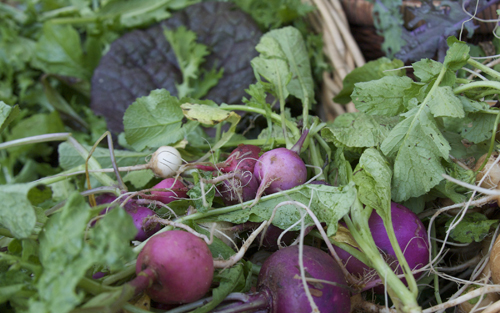The possibilities for a new garden can seem endless, but choosing what to grow can make all the difference, especially for beginner gardeners.
University of Georgia horticulturalists Bob Westerfield and George Boyhan know what it takes to create a prosperous garden. They have created the following helpful hints and a list of the top five easiest plants for beginners:
Green beans. “A trick for green beans is to soak the seeds in a glass of water overnight and then plant them the next day,” Westerfield said. “This speeds the germination process.”
Green beans are warm season vegetables that are more tolerant of cooler temperatures. Planting green beans early is not as problematic as it is with other vegetables. They also do not need a lot of fertilizer.
Radishes. “The absolute easiest plant to grow is a radish. They are practically bomb-proof,” Westerfield said. It is the fastest developing vegetable, taking about 28 days to mature.
Eggplants. This vegetable can be grown in a tomato cage or staked. They are easy because they are seldom bothered by problems like insects. They are also extremely prolific.
Ratooning is a technique that helps rejuvenate the plant and produce a second crop. To do it, “cut back the plant eight to 10 inches from the ground,” Boyhan said.
Peppers. Peppers need plenty of room to expand. They can handle light frost and cooler temperatures.
“Peppers are fun to grow because there are so many shapes and colors available,” Westerfield said. “Colors range from dark green to chocolate and even a purple hue.”
Tomatoes. Although Boyhan referred to tomatoes as “tried and true” and Westerfield noted they are the most popular vegetable, both say tomatoes can be quite problematic for beginner gardeners. Tomatoes are usually staked or caged and grown from transplants.
Because they are tropical plants, tomatoes are susceptible to Georgia’s humidity, rainfall and high heat. They are also quite disease-prone.
Lots of tomato varieties exist, but Westerfield says the easiest to grow is the cherry tomato. The fruit is the size of a cherry or grape and the plant is more forgiving in terms of diseases.
Gardening tools. Even after choosing the most appropriate plants, no garden can be successful maintained without gardening tools. Essential tools include hand tools like a hand trowel and shovel, a hoe and tomato cages or stakes (if the plants call for them).
“A mini tiller is handy, too, but if the garden is large, I suggest investing in a large tiller,” Westerfield said. “It’s worth its weight in gold.”
Boyhan says the biggest problem home gardeners can face in the garden is weeds. “It is important to get out there and take care of the weeds when they are small, he said. “Do not let them get big.”
Sunlight, soil, water and fertilizer are vital to the success of a garden. Gardeners might not realize, however, that soil temperature is also crucial.
“The biggest key to growing vegetables is knowing the soil temperature and what plants work best at that temperature,” said Westerfield. “You can use a soil thermometer or go to www.georgiaweather.net and find the soil temperature throughout all regions of Georgia.”
For more information about home gardening, contact your local UGA Cooperative Extension office by calling 1-800-ASK-UGA1.










